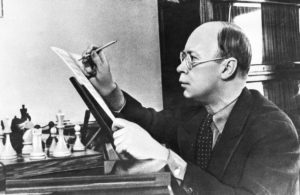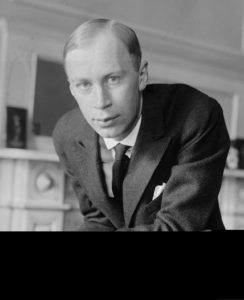
We mark the first performance of Sergei Prokofiev’s ballet Romeo and Juliet on January 11, 1940 – 81 years ago today – by the Kirov Ballet in Leningrad, what today is St. Petersburg.
Prokofiev was born on April 23, 1891 in Ukraine. He attended the St. Petersburg Conservatory as both a pianist and composer and graduated in 1914, first in his class. His rise to fame as both a pianist and composer was meteoric, and by 1917, the 26-year-old Prokofiev had come to be considered among Russia’s very best and brightest. Unfortunately, that’s also when current events had their way him.
By 1917, World War One had been raging for three years. As the only son of a widow, Prokofiev had not been called up into the Russian army; a good thing, considering that four million Russians died in combat between 1914 and 1917. Violent frustration over the Russian war effort led Czar Nicholas II to abdicate on March 2, 1917. An armed insurrection brought Vladimir Lenin’s Bolshevik Party to power in November of 1917, and the Russian Civil War began. The Civil War would last for five horrific years and kill an additional 9 million Russians.

In 1918, deciding that things were becoming a bit dicey there in Russia, Prokofiev decided that the time was right for a brief trip abroad. He later wrote:
“On May 7, 1918, I started my journey, which was to take me abroad for only a few months . . . or so I thought.”
In reality, it would be eighteen years before Prokofiev permanently returned home.
His first stop – in 1918 – was the United States. In 1923 he decamped to Paris, which remained his “home base” until 1936. Prokofiev experienced genuine success during these years as both a pianist and composer, but he never felt fully appreciated or at home in the West.
So when he was invited to return permanently to the Soviet Union in 1936, he jumped at what he considered to be a great opportunity. It was, in fact, the single biggest mistake he ever made, a mistake he shared with Napoleon and Hitler, who also believed they could march through Russia in victorious triumph.…
Continue reading, only on Patreon
Listen on the Music History Monday Podcast
Podcast: Play in new window
Subscribe: Apple Podcasts | Spotify | Pandora | iHeartRadio | RSS | More
